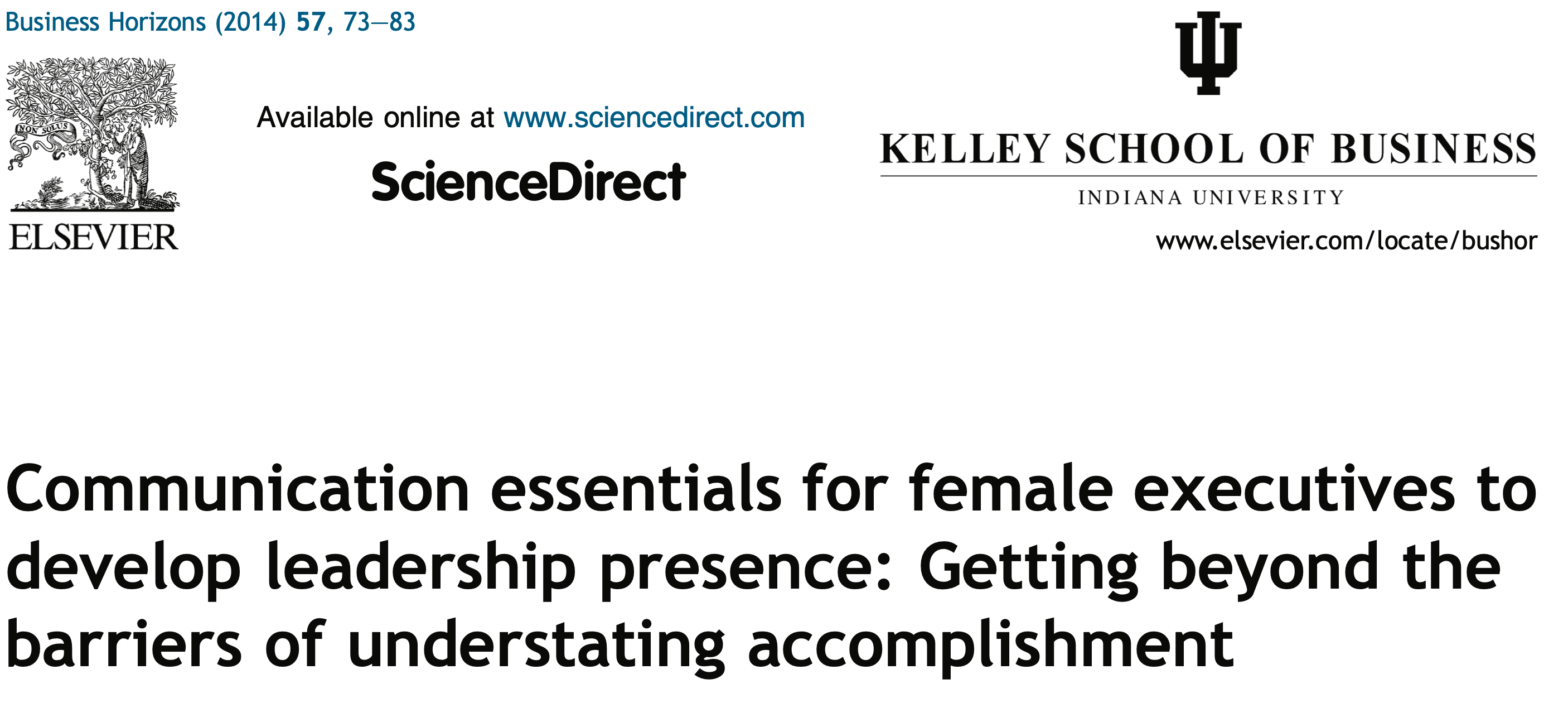Have questions about a blog post? Email the author directly. We love hearing from people.
7 Oct Calling all Wonder Women!
 As female leaders, we must stay current with strategies for communicating our confidence. So, here’s an exciting piece of research. As a Coach, I work with my clients to focus on the goal of speaking with confidence.
As female leaders, we must stay current with strategies for communicating our confidence. So, here’s an exciting piece of research. As a Coach, I work with my clients to focus on the goal of speaking with confidence.
The way we talk about our accomplishments can make or break us. So, here’s an interesting article to help keep perspective. The research focuses on identifying key female areas communicators can use to strengthen their effectiveness.
Be a business superhero in your skin and harness your tools speak with confidence.

 `
`
READ MORE
30 Sep Communication Style
 What impression do other people have of you? Have you ever focused on what and how you communicate with others? If asked to use two words to describe you, what would they say? For that matter, what would you say? Centuries ago, Sir Walter Raleigh wrote that communication needs to be “chameleon-like.” He was not talking about being something different with each person you meet. He was urging leaders of the time to be aware of their communication style. (more…)
What impression do other people have of you? Have you ever focused on what and how you communicate with others? If asked to use two words to describe you, what would they say? For that matter, what would you say? Centuries ago, Sir Walter Raleigh wrote that communication needs to be “chameleon-like.” He was not talking about being something different with each person you meet. He was urging leaders of the time to be aware of their communication style. (more…)
15 Sep Is It Possible to Over Prepare for a Presentation?
 When preparing a presentation, TED talk, webinar, investor pitch, wedding toast, or anything in between, there can be a struggle with how much to prepare in advance. (more…)
When preparing a presentation, TED talk, webinar, investor pitch, wedding toast, or anything in between, there can be a struggle with how much to prepare in advance. (more…)
20 Jul What Continued Zoom Fatigue and the COVID Delta Variant Means for You and Your Team

If you’re like me, you’ve experienced heavy Zoom fatigue in the last 16 months. During this ongoing pandemic, it’s earned its slang term, right alongside “Quarantine” (the drink you make with whatever you can find in your fridge or freezer), “Blursday” (an unspecified day because of lockdown’s disorientating effect on time), “zoom bombing” (hijacking a Zoom video call). “WFH” (working from home) and “quaranteams” (online teams created during lockdown). (more…)
13 Jul Does virtual presenting level the speaking field?
 Last week, I worked with a client who shared with me that her nervousness associated with public speaking was not as much of a problem since the world went virtual. I was curious about what changed for her or what had helped her. When working with clients on controlling their nervousness, there are many things to be considered. A major focus of the help we bring is with thoughts. The thoughts are what people say to themselves before, during, and after the presentation. We all talk to ourselves. It’s what we say that has a tremendous impact on how well we can control nervousness. She said, “Kristen, we are all equal now. Everyone is in the same size box. No one takes up more space than anyone else on the screen.” Hearing this brought a smile to my face. This client has successfully changed her thoughts to be more positive and productive. So whether or not you believe that virtual presenting levels the speaking field, the more important takeaway is that changing the way you think about something and internalize it helps create a more positive outcome.
Last week, I worked with a client who shared with me that her nervousness associated with public speaking was not as much of a problem since the world went virtual. I was curious about what changed for her or what had helped her. When working with clients on controlling their nervousness, there are many things to be considered. A major focus of the help we bring is with thoughts. The thoughts are what people say to themselves before, during, and after the presentation. We all talk to ourselves. It’s what we say that has a tremendous impact on how well we can control nervousness. She said, “Kristen, we are all equal now. Everyone is in the same size box. No one takes up more space than anyone else on the screen.” Hearing this brought a smile to my face. This client has successfully changed her thoughts to be more positive and productive. So whether or not you believe that virtual presenting levels the speaking field, the more important takeaway is that changing the way you think about something and internalize it helps create a more positive outcome.
6 Jul Paraprosdokians
 We love paraprosdokians, figures of speech in which the latter part of a sentence or phrase is surprising or unexpected.
We love paraprosdokians, figures of speech in which the latter part of a sentence or phrase is surprising or unexpected.
- Where there’s a will, I want to be in it.
- The last thing I want to do is hurt you, but it’s still on my list.
- Since light travels faster than sound, some people appear bright until you hear them speak.
- If I agreed with you, we’d both be wrong.
- War does not determine who is right – only who is left.
- Knowledge is knowing a tomato is a fruit. Wisdom is not putting it in a fruit salad.
- They begin the evening news with ‘Good Evening,’ then proceed to tell you why it isn’t.
- To steal ideas from one person is plagiarism. To steal from many is research.
- I thought I wanted a career. Turns out, I just wanted pay checks.
- In filling out an application, where it says, ‘In case of emergency, notify:’ I put “DOCTOR.”
- I didn’t say it was your fault, I said I was blaming you.
- Women will never be equal to men until they can walk down the street…with a bald head and a beer gut, and still think they are sexy.
- Behind every successful man is his woman. Behind the fall of a successful man is usually another woman.
- A clear conscience is the sign of a fuzzy memory.
- You do not need a parachute to skydive. You only need a parachute to skydive twice.
- Money can’t buy happiness, but it sure makes misery easier to live with.
- There’s a fine line between cuddling and…holding someone down so they can’t get away.
- I used to be indecisive. Now I’m not so sure.
- You’re never too old to learn something stupid.
- To be sure of hitting the target, shoot first and call whatever you hit the target.
- Nostalgia isn’t what it used to be.
- Change is inevitable, except from a vending machine.
- Going to church doesn’t make you a Christian any more than standing in a garage makes you a car.
- I’m supposed to respect my elders, but now it’s getting harder and harder for me to find one.
30 Jun Executive presence: what is it, why do you need it, and how do you build it?
 During these last 467 days, we’ve had to make significant adjustments to the way we convey our presence and confidence. As we moved into a virtual world, executive presence was created, focusing on how we look and sound on camera. So, the question is, how do we build a relationship with somebody that you’re only meeting from the waist up? How do you establish that executive presence in a way that can build trust and rapport? In this medium, accepting its limitations and advantages, one aspect of projecting executive presence is the ability to inspire confidence. This means inspiring confidence in our peers as capable and reliable colleagues. In our junior folks, it’s inspiring confidence as a leader that they want to follow. And, importantly among senior leaders, inspiring confidence instills that you have the potential for great achievements. (more…)
During these last 467 days, we’ve had to make significant adjustments to the way we convey our presence and confidence. As we moved into a virtual world, executive presence was created, focusing on how we look and sound on camera. So, the question is, how do we build a relationship with somebody that you’re only meeting from the waist up? How do you establish that executive presence in a way that can build trust and rapport? In this medium, accepting its limitations and advantages, one aspect of projecting executive presence is the ability to inspire confidence. This means inspiring confidence in our peers as capable and reliable colleagues. In our junior folks, it’s inspiring confidence as a leader that they want to follow. And, importantly among senior leaders, inspiring confidence instills that you have the potential for great achievements. (more…)
29 Jun Lead With Purpose
 People are going to change as a result of this time in our lives. You may even need to change your business model.
People are going to change as a result of this time in our lives. You may even need to change your business model.
Right now, it’s a new day – Every day. Change is happening so quickly. Business and life as we know it has changed since just a week ago.
In times of what we call the FUD Factor – Fear, Uncertainty, and Doubt, the companies that communicated and demonstrated that they care about their teams and clients build incredible loyalty long after the crisis has passed. (more…)
22 Jun Are cell phones hurting the next generation?
 A recent article on CNN was about government-run camps to treat teen internet addiction in South Korea. After reading the article, I thought what a fantastic idea. I wonder how many parents think their kids are addicted to their cell phones. The South Koreans may be on to something.
A recent article on CNN was about government-run camps to treat teen internet addiction in South Korea. After reading the article, I thought what a fantastic idea. I wonder how many parents think their kids are addicted to their cell phones. The South Koreans may be on to something.
According to South Korea’s government, in 2018, 98% of South Korean teens used a cell phone. The article mentioned a 16-year who, after spending 13 hours straight on her cellphone, signed herself up for the camp. Her phone gave her continuous entertainment, and when she got bored, she moved on to the next video or game. She felt detached from reality when on her phone. Her grades were slipping, and she fought with her dad about her phone usage daily. (more…)
